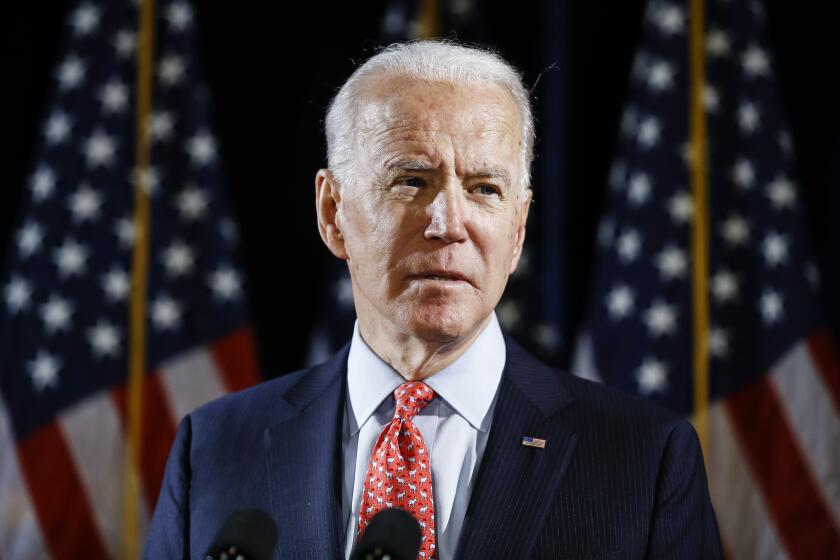Billionaire who wants to impeach Trump makes the October presidential debate stage
- Share via
Tom Steyer, a California billionaire and leader of a movement to impeach President Trump, qualified on Sunday for October’s Democratic presidential debate.
Steyer received the support of 2% in a CBS News/YouGov poll of Nevada voters, the final mark he needed to hit to take part in the debate in Ohio.
Steyer will join 10 other candidates who have already met the thresholds set by the Democratic National Committee. Because there are now 11 participants, the debate will likely be split over two nights on Oct. 15 and 16 in Ohio. The DNC has not announced the exact location or media hosts of the fourth debate.
Steyer’s appearance will give the former hedge fund manager turned environmental activist the largest audience he has ever faced in what could be a critical moment for his fledgling presidential campaign. (He initially said he wasn’t running for president in January, before changing his mind and declaring a bid in July.)
“He’s very smart and he’s articulate. He has all the natural skills to be good in a debate,” said Bill Carrick, a veteran Democratic strategist who is not aligned with any candidate in the 2020 campaign.
“He certainly has the resources to get himself significant exposure and communicate with a large number of people in the early states and create momentum,” Carrick said. “The test will be in this environment, whether he can be a serious player on the stage with these other candidates.”
The field is down to Joe Biden now that Bernie Sanders ended his presidential campaign. Here is the Democrat heading for a battle with President Trump.
Steyer’s presence practically guarantees that the impeachment of Trump — a source of division among Democrats that has not been the focus of earlier debates — will come up.
“It’s something that divides his fellow candidates on the stage,” said Aaron Kall, a debate expert at the University of Michigan. “That could cause some controversy or maybe some kind of viral moment if it gets heated or passionate. That’s probably his best bet to make sure he gets talked about on that stage.”
Steyer has become a top donor to Democratic candidates and causes in recent years, giving more than $235 million to outside spending groups in the last three elections, according to the Center for Responsive Politics. Much of that was spent calling for Trump’s impeachment, as well as climate change policy.
Now, Steyer plans to spend at least $100 million of his own money on his presidential campaign. About $12 million of that went to television ads and digital outreach over six weeks in the summer in an unsuccessful effort to qualify for the September debate, which required that he receive the support of at least 130,000 individual donors, coming from at least 400 unique donors in each of 20 or more states, and 2% in four polls sanctioned by the DNC.
Steyer’s eye-popping spending prompted criticism from his rivals.
“I think the DNC rules were well-intentioned, but what it really has done is allowed a billionaire to buy a spot on the debate stage,” said Montana Gov. Steve Bullock on MSNBC in August. He is one of several candidates who have not met the criteria to participate in the October debate; the deadline to qualify is Oct. 1.
“We’re getting to the point where we’re spending money online as opposed to actually talking to voters,” Bullock said.
Steyer countered that his growth in the polls showed his message was resonating with voters.
“I am doing nothing but trying to speak the truth and stand up against people who have bought the democracy,” the candidate said in an interview.
Steyer’s campaign and political observers argue that Steyer’s money goes only so far — he has to perform well during the debate to gain traction among voters.
In addition to Steyer, those who have qualified for the October debate are former Vice President Joe Biden; South Bend, Ind., Mayor Pete Buttigieg; former Texas Rep. Beto O’Rourke; businessman Andrew Yang; former Obama Cabinet member Julian Castro; and Sens. Bernie Sanders, Elizabeth Warren, Kamala Harris, Cory Booker and Amy Klobuchar.
Debate preparation is key, especially for a newcomer to such faceoffs. Steyer has shown himself to be averse to such preparations, according to former advisors who asked for anonymity to speak candidly.
When he considered running for governor and Senate in California, Steyer rejected any kind of formal speech training because he favored pursuing what he viewed as an authentic persona, according to the former advisors.
Steyer ultimately decided against running for those offices.
Times staff writer Evan Halper in Washington, D.C., contributed to this report.
More to Read
Get the L.A. Times Politics newsletter
Deeply reported insights into legislation, politics and policy from Sacramento, Washington and beyond. In your inbox twice per week.
You may occasionally receive promotional content from the Los Angeles Times.












